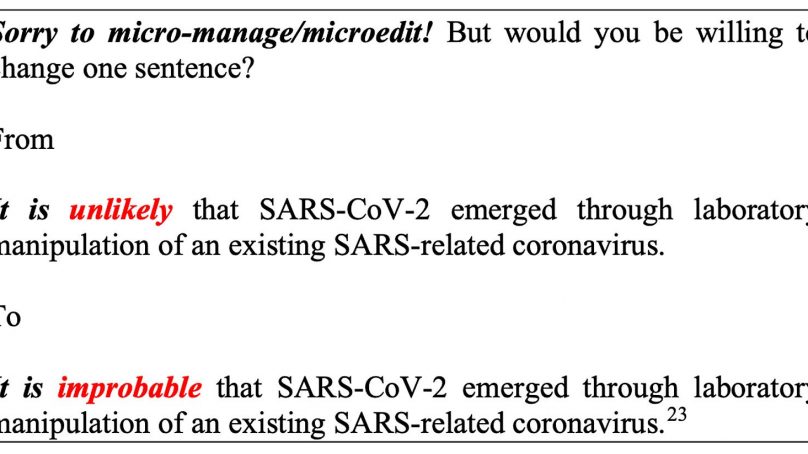
The virologists behind the “proximal origin” article have strongly denounced accusations that they were improperly swayed by the participation of influential funders of scientific research. They have asserted that they seriously considered the lab leak theory but that evidence accumulated in favour of a natural origin, assuaging their earlier concerns about the Wuhan lab.
However, the congressional memo raises new questions about the idea that the virologists ever seriously considered the lab leak theory.
Columbia University virologist Ian Lipkin wrote on February 11, 2020, that an early draft of the article “does not eliminate the possibility of inadvertent release following adaptation through selection in culture at the institute in Wuhan,” citing a “nightmare of circumstantial evidence” at the Wuhan lab.
The new congressional memo shows for the first time that Holmes wrote on February 11, 2020, that he agreed with Lipkin’s assessment, even after he had drafted the first version of the article that would dispel the lab leak theory.
Holmes also said he had concerns about how quickly the virus had emerged in humans, apparently without detection in a likely zoonotic reservoir, in contrast to the SARS epidemic.
“It is indeed striking that this virus is so closely related to SARS yet is behaving so differently. Seems to have been pre-adapted for human spread since the get go,” Holmes said. The “proximal origin” article nodded to the fact that SARS-CoV-2 appeared pre-adapted to humans.
But scientists who have stated that SARS-CoV-2 appeared pre-adapted to humans in more straightforward terms, and who left open the possibility that the adaptation had occurred in the lab, have received fierce backlash.
Questions about the integrity of the impactful “proximal origin” article first swirled nearly two years ago. A series of emails released under FOIA in 2021 and 2022 demonstrated that the authors had expressed private concerns about a lab origin before doing a public about-face.
Andersen wrote on January 31, 2020 that he, Holmes and Tulane University virologist Robert Garry found that “the genome looks inconsistent with natural evolution.” Garry wrote on February 2, 2020, that he could not understand how SARS-CoV-2 could have emerged naturally after comparing its genome to a highly similar virus at the WIV:
“I just can’t figure out how this gets accomplished in nature. Do the alignment of the spikes at the amino acid level … stunning.” Yet the “proximal origin” article asserted that any lab origin theory was implausible.
Congressional Republicans have sought answers about whether the private teleconference with powerful funders of scientific research on February 1, 2020, had an improper influence. The virologists have rebutted that claim in part by pointing to the emergence of data in China describing coronavirus data suggesting a highly similar receptor binding domain in pangolins around the same time they were drafting the article.
Pangolins are highly trafficked in China, although rarely sold live in wet markets. But the new congressional memo suggests that Andersen, the article’s lead author, did not find that the pangolin data alone provided sufficient evidence in favour of a natural origin.
“The newly available pangolin sequences do not elucidate the origin of SARS-CoV-2 or refute a lab origin,” Andersen said in an email on February 21, 2020. “[T]here is no evidence on present data that the pangolin CoVs are directly related to the Covid-19 epidemic.”
Congressional investigators state in the memo that given the pangolin data was apparently not compelling evidence in favour of a natural origin theory, the factor that likely pushed the scientists toward the natural origin theory was undue influence by Collins, Fauci and Farrar.
“The pangolin data was not the compelling factor,” the memo reads. “To this day, the only known intervening event was the February 1 conference call with Dr Fauci.”
Meanwhile, Stanley Perlman, a University of Iowa virologist who edited one of the papers describing the pangolin coronavirus data, said that the new congressional memo has not changed his stance in favour of a natural origin.
However, the publication did issue a correction stating that pangolins were an unlikely intermediate host in 2021. The committee also asserts that Andersen’s private statements contradict assertions made by a lawyer for Scripps Research in an August 2021 letter.
Asked about the apparent discrepancies, a Republican aide responded that “the select subcommittee is continuing to evaluate all available evidence, including whether or not Dr Andersen was truthful to the committee.”
Asked whether the scientists scrutinised in the memo, including Fauci, would be called to testify, the aide said that “the select subcommittee previously requested their testimony and those plans have not changed.”
Despite the scrutiny that has fallen on Fauci – President Biden’s former chief medical adviser – Select Subcommittee on the Coronavirus Pandemic Chair Brad Wenstrup (Republican-Ohio) said in a Face the Nation interview Sunday that the investigation would seek to work in a bipartisan fashion.
“I just want to get to facts,” Wenstrup said. “There’s going to be some moments, I’m sure, of some emotions flaring. The last three years have been tough on everybody.”
- A Tell / The Defender report / This article was originally published by US Right to Know











